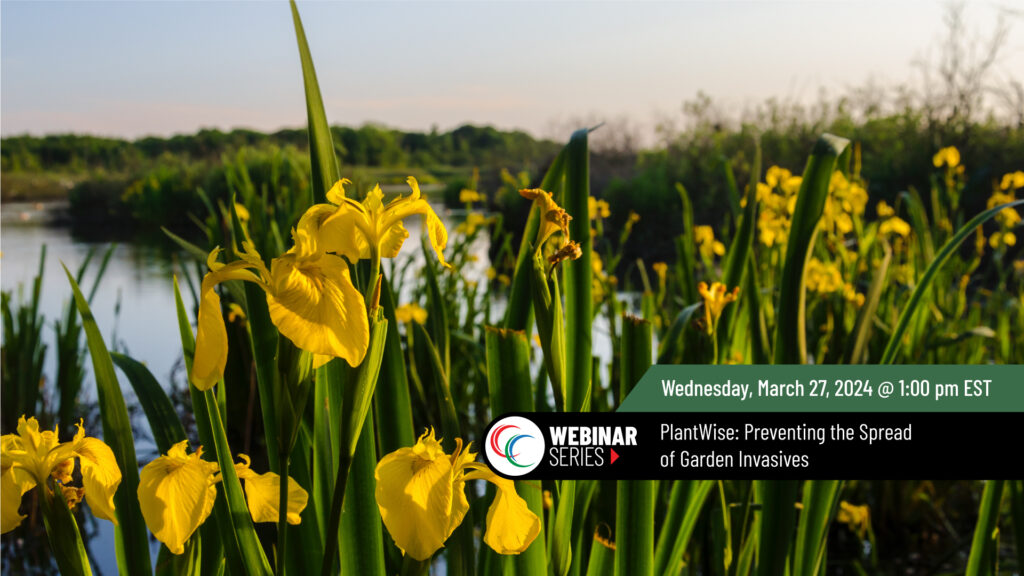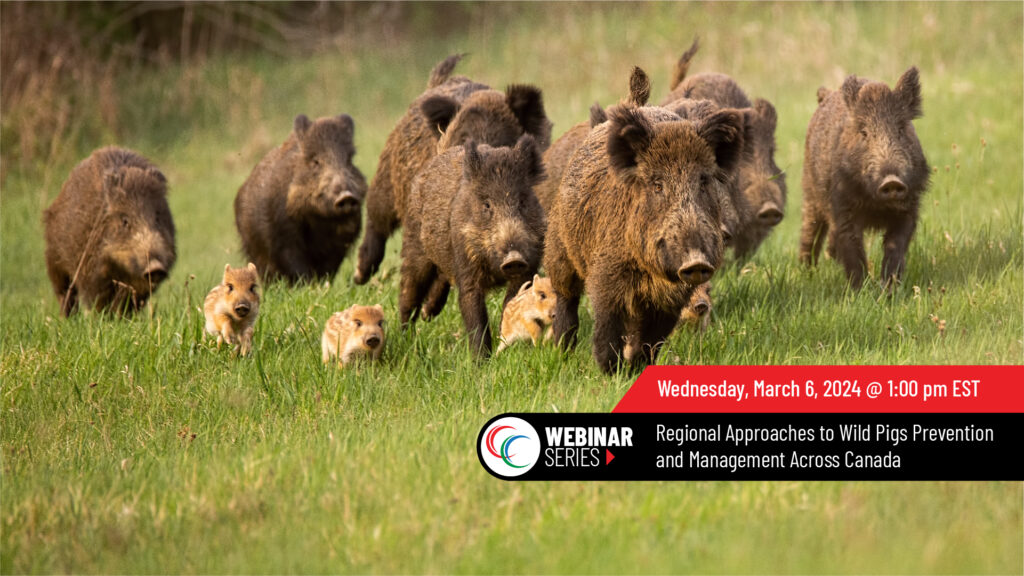The National Invasive Species Winter Webinar series is here!
In tandem with Invasive Species Awareness Week (February 22-March 3), the Canadian Council on Invasive Species (CCIS) is working to increase awareness about invasive species in Canada through our national winter webinar series. CCIS is working closely with partners to deliver a range of speakers that will highlight projects and research helping to promote awareness and tackle emerging invasive species issues across Canada. Webinars will be held on Wednesday’s at 1pm or 2pm Eastern Standard Time and will include invasive species topics related to communication, climate change, emerging invasive species, and more! Stay tuned as we announce new topics and speakers.
You can support our work including our winter webinar series to spread the word about invasive species; eliminate the pathways invasive species use to spread in Canada; and protect our ecosystems by making a donation.
Access previous webinar recordings
Subscribe for webinar recording updates
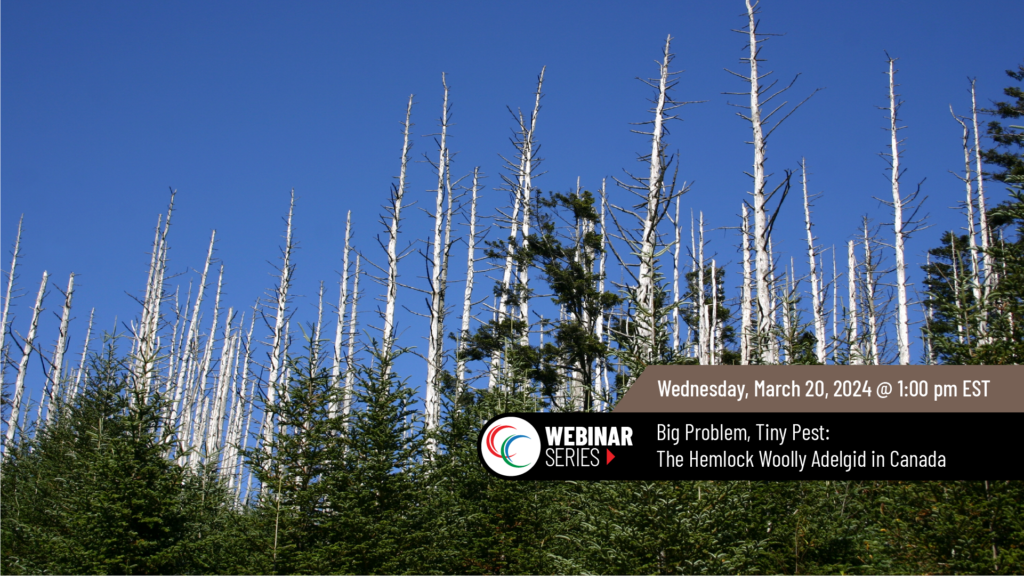
Big problem, tiny pest: The hemlock woolly adelgid in Canada
Wednesday, March 20, 2024 @ 1:00 pm EST
Meet the Speakers
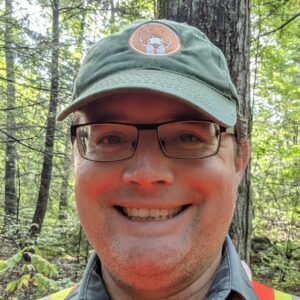
Chris MacQuarrie, Natural Resources Canada & Ron Neville, Canadian Food Inspection Agency
Chris MacQuarrie researches the risk and management of invasive species in Canada’s forests. His work focusses on the threats from the hemlock woolly adelgid and emerald ash borer. He is based at the Great Lakes Forestry Centre in Sault Ste. Marie, Ontario.
Ron works as a plant health survey biologist with the Canadian Food Inspection Agency and is based in Dartmouth, Nova Scotia. Ron has worked on many pest surveys and responses in Canada for example the Asian longhorn beetle, emerald ash borer and hemlock woolly adelgid. He also co-chairs the Hemlock Woolly Adelgid Working Group – Maritimes, a collaboration of government, non-government, and Indigenous leadership groups devoted to helping protect hemlock forests in eastern Canada.
Presentation Description:
Hemlock woolly adelgid is a small insect that is causing a big problem to hemlock trees in eastern Canada. This webinar will discuss how the insect was introduced to Canada, the steps that Canada takes to prevent, detect and manage new introductions and spread, as well as research efforts in Nova Scotia and Ontario towards developing new tools to help manage and mitigate its impacts.
PlantWise: Preventing the Spread of Garden Invasives
Wednesday, March 27, 2024 @ 1:00 pm EST
Meet the Speakers
Gabby Nichols, Canadian Council on Invasive Species, Emma Nikkel, Invasive Species Council of BC, Vicki Simkovic, Ontario Invasive Plant Council, & Hughstin Grimshaw-Surette, Nova Scotia Invasive Species Council
Presentation Description:
Most exotic plants in Canada were intentionally introduced for their attractiveness as garden plants. Unfortunately, some of these far-away species end up becoming invasive in their new home and can escape gardens, impacting our native ecosystems, way of life, and economy.
PlantWise is a take action program that supports the (ornamental) horticulture industry’s transition to become invasive-free. This program further helps gardeners and industry understand which plants are invasive and harmful to our communities and to make ‘PlantWise’ choices through ‘Grow Me Instead’ and other educational tools. Hear about the great resources being implemented across Canada including at the national and provincial level with speakers from the Canadian Council on Invasive Species, the Invasive Species Council of BC (ISCBC), the Ontario Invasive Plant Council and the Nova Scotia Invasive Species Council.
More details coming soon!
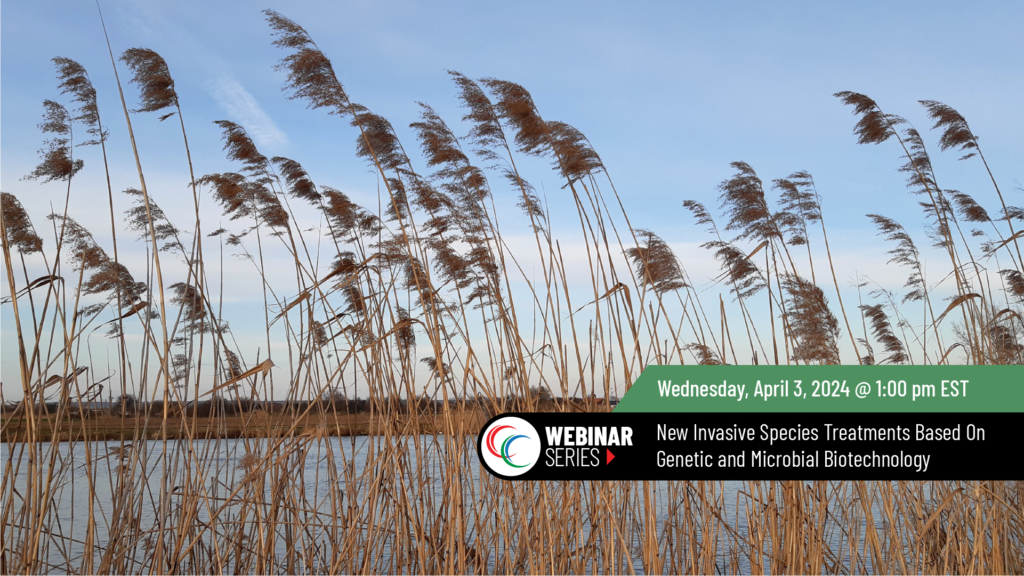
Promising new invasive species treatments based on genetic and microbial biotechnology
Wednesday, April 3, 2024 @ 1:00 pm EST
Meet the Speaker
Kurt Kowalski, Great Lakes Science Centre, U.S. Geological Survey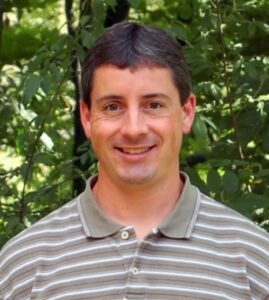
Dr. Kurt Kowalski is a research wetland ecologist at the U.S. Geological Survey Great Lakes Science Center based in Ann Arbor, MI USA. His research focuses on the restoration and management of Great Lakes coastal wetland habitats, including the development of novel management approaches for the invasive Phragmites australis. He has extensive involvement in the application of research results into practice and policy, including the development of adaptive management approaches and online decision support tools.
Presentation description
Conventional approaches to managing invasive plant species (e.g., cutting, drowning, herbicide) can be effective, but often they are resource intensive and not species specific. Therefore, innovative new treatments may provide resource managers with more tools to manage invasive Phragmites australis and other species. One approach is focused on a natural defense mechanism that limits the expression of certain genetic traits, and a second approach is seeking to disrupt the symbiotic relationships between invasive plants and their microbiome (e.g., bacteria, fungi). Advancements in biotechnology research are stimulating the development of new treatment options for resource managers targeting invasive species.
RECORDED WEBINARS IN THIS SERIES
Access previous webinar recordings
Subscribe for webinar recording updates
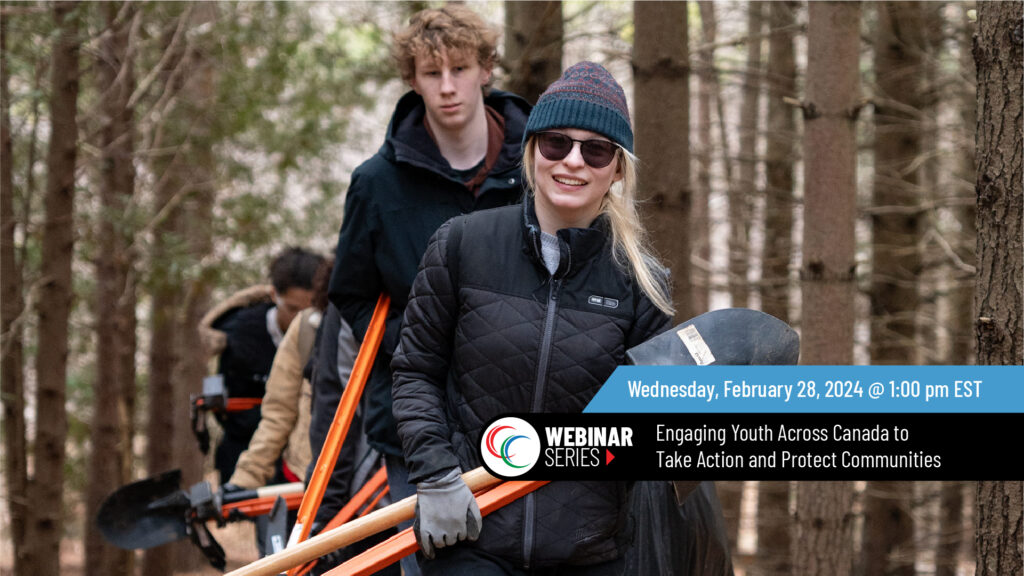
Approaches to Engaging Youth Across Canada to Take Action and Protect Communities
Wednesday, February 28, 2024 @ 1:00 pm EST
Access previous webinar recordings
Meet the Speakers
Fel Castañeda, Chirs Sullivan, and Emily Green, Canadian Council on Invasive Species

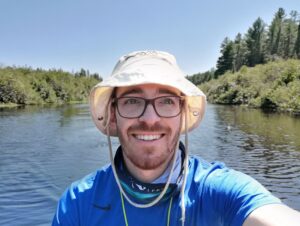

Fel is the National Supervisor for the Youth Nature Keepers program. They are experienced in a wide range of fields related to youth, stewardship, and education, and they have had the privilege of working in several different bioregions across three different continents. They are passion
ate about bringing ecology into every day life, and finding a balance between local and global sustainability priorities and finding ways to heal through stewardship.
Chris Sullivan is the Youth Nature Keepers Program Coordinator for New Brunswick. Chris is an environmental educator with years of conservation experience in the non-profit space, being involved in climate change research, species-at-risk work and youth program development. He now works closely with the New Brunswick Invasive Species Council and youth volunteers throughout the province to help protect New Brunswick’s environment and raise awareness about the growing threat of invasive species.
Emily is a Youth Engagement Coordinator in Ontario. She is an environmental educator with experience teaching children and youth, and is passionate about connecting people with nature. Emily graduated from Wilfrid Laurier University with a Bachelor’s degree in Environmental
Studies and Minor in Political Science with experience in field work and project development. Outside of work, Emily enjoys being outdoors, photographing wildlife, and practicing species ID.
Presentation Description:
Hear from our youth engagement experts on tactics to better engage youth to take action to enhance the ecosystems in their local communities. This presentation will include tools and tactics to engage youth, as well as testimonials sharing perspectives from youth taking action across Canada through our Youth Nature Keepers.
The Youth Nature Keepers program offers a unique opportunity for youth to create their own community projects with the guidance of program coordinators. As program coordinators, we provide youth with resources to guide their project development including a guidebook, worksheets, information packages, and one-on-one support. Beyond project support, the program offers engagement opportunities both in-person and online, creating the community that is the YNK network. This webinar will cover the Coordinator’s on the ground work in their respective corners of Canada, as well as the accomplishments of volunteers in New Brunswick and what’s planned for the coming weeks!
Regional Approaches to Wild Pigs Prevention and Management Across Canada
Recorded on Wednesday, March 6, 2024 @ 1:00 pm EST
Access previous webinar recordings
Meet the Speakers

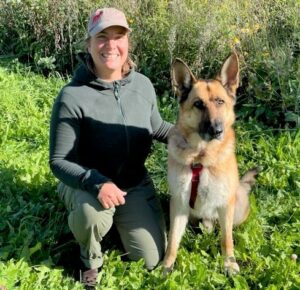
Hannah McKenzie, Wild Boar Program Specialist, Alberta Agriculture and Irrigation & Brook Schryer, Invading Species Awareness Program, Ontario Federation of Anglers and Hunters
Hannah graduated from the University of Alberta with an MSc in Mathematical and Statistical Biology and an MSc Applied Mathematics. Prior to taking on her current role as
Wild Boar Program Specialist, Hannah worked with the Alberta Aquatic Invasive Species program along with her K9 partner Seuss. Seuss puts his nose to work to stop invasive species and is trained to detect invasive mussels and wild boar scat. Hannah employs her quantitative skills to support evidence-informed policy and program decisions. She lives on an acreage with her husband, dogs and chickens.
Brook Schryer is the Assistant Coordinator with the Invading Species Awareness Program (ISAP) out of the Ontario Federation of Anglers and Hunters (OFAH). In his eight years with the program, his work has focused on aquatic invasive species, including outreach and education, surveillance and monitoring, as well as tracking initiatives. More recently, he has focused his efforts on monitoring programs, including the Mysterysnail Management and Removal Project, Wild Pig Surveillance Program, and working with partners on the Marbled Crayfish Working Group.
Presentation Description:
Hannah’s presentation will provide an overview of wild boar in Alberta. Hannah will review how they got here, what we know about their current distribution, and the threat they pose to agriculture, the environment, and the health of both animals and humans. Hannah will also talk about the collaborative actions the Alberta Government and our partners are taking to protect Alberta from this destructive invasive species.
Brook Schryer’s presentation will highlight the Invading Species Awareness Program’s Wild Pig Surveillance Program that is delivered via contributions from the Green Shovels Collaborative. Since 2021, the program has been working with volunteers across the province to set up baited sites with trail cameras to monitor for any occurrences of wild pigs that may be on Ontario’s landscape.
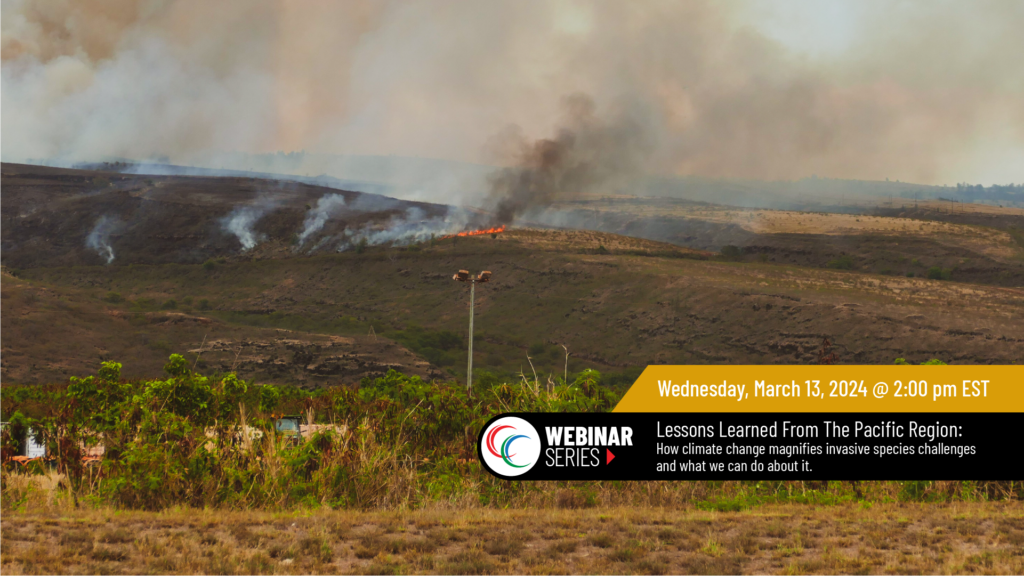
Lessons learned from the Pacific Region: How climate change magnifies invasive species challenges and what we can do about it
Wednesday, March 13, 2024 @ 2:00 pm EST
Access previous webinar recordings »
Meet the Speaker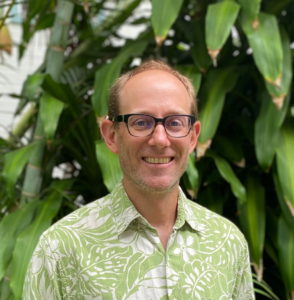
Dr. Elliott Parsons, Specialist, Pacific Regional Invasive Species and Climate Change Network, University of Hawaiʻi, Mānoa
Dr. Elliott Parsons is a specialist with the Pacific Regional Invasive Species and Climate Change (Pacific RISCC) Management network through the Pacific Islands Climate Adaptation Science Center at the University of Hawaiʻi at Mānoa. He works with a dedicated leadership team from Hawaiʻi and across the US Affiliated Pacific Islands to create stronger manager-researcher networks, translate relevant science for managers, and assess research gaps at the nexus of climate change and invasive species. He has a Ph.D. in Fish and Wildlife Biology from the University of Montana and was manager of a 40,000 acre State Forest Reserve on Hawaiʻi Island with the State of Hawaiʻi, Division of Forestry and Wildlife for 10 years prior to his current position.
Presentation Description:
Climate change and invasive species are negatively impacting Pacific Island communities and ecosystems, yet climate change is expected to exacerbate management challenges. As conditions shift, managers will need to adapt their practices to account for a variety of climate impacts such as shifting biomes and species distributions, as well as increased severity of storms, drought, floods, and wildfire which will all magnify the risk of invasion. Dr. Parsons will discuss these challenges, the role of Pacific RISCC, and how invasive fire-adapted grasses and a changing climate are fueling a growing wildfire crisis in Hawaiʻi and what we can do about it.

